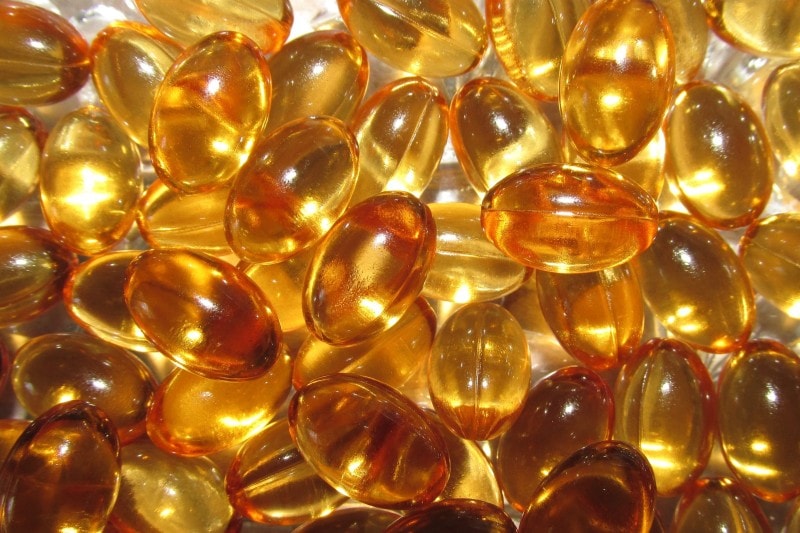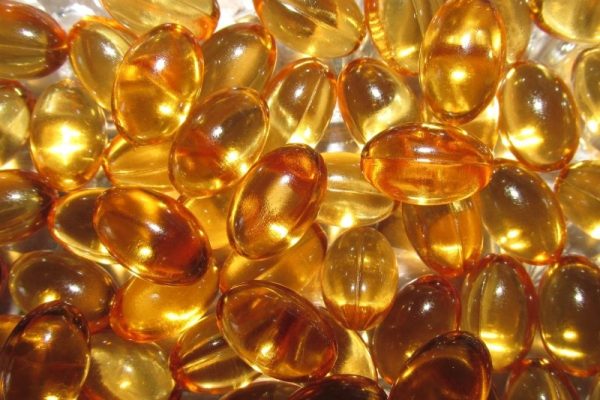Dogs need vitamin E. It’s an essential nutrient that provides antioxidants that protect against free radical damage. Free radicals are negatively charged atoms released during your dog’s normal metabolic processes. But when dogs, or humans, are ill or under stress, their bodies produce more of these particles, and having too many free radicals often results in conditions such as arthritis and heart disease. When dogs are exposed to environmental toxins and pesticides, they will produce more free radicals due to increased oxidative stress. So, free radicals are basically waste products that result from various chemical reactions in the cell. When they built up, they harm the cells of the body.
Although dogs require vitamin E, you don’t necessarily need to supplement your pet’s diet with this nutrient. Most high-quality commercial dog foods that meet the American Association of Food Control Officials (AAFCO) requirements contain more than enough vitamin E to keep your dog healthy. Read on for more information about dogs and this vital nutrient.
Vitamin E’s Benefits
Vitamin E is critical to your dog’s health; it plays a crucial role in their metabolism and immune functions and is vital for your dog’s eye and skin health. It also supports the metabolism of essential compounds, such as vitamin C.
It also provides antioxidant protection and helps defend against and repair cellular damage caused by free radical exposure. Free radical damage often results in the development of chronic diseases such as cancer, diabetes, arthritis, and canine dementia. Antioxidants also support your canine’s ocular, brain, and heart health by reducing inflammation.

Signs of a Vitamin E Deficiency
Dogs suffering from vitamin E deficiencies often have skin problems, trouble seeing, and experience lowered immune function. The condition often happens when dogs eat homemade formulations that lack vital minerals and vitamins.
Most dogs receive enough vitamin E through their diet if they’re eating a high-quality commercial product that provides at least 50 IU of vitamin E per day (the AAFCO recommended minimum), but some dogs may require more depending on their health.
Natural Sources of Vitamin E
Most dogs get more than enough vitamin E through what they eat, as long as they consume a well-balanced diet! It is naturally found in fish like salmon and trout as well as in fruit, particularly berries and mangos. Leafy greens, red peppers, and turnips are also naturally packed full of vitamin E. But keep in mind that dogs do better when fed a canine-specific diet and should obtain most of their nutrients through their own food.

Benefits of Supplementation
There’s some evidence that vitamin E may benefit dogs with itchy skin and certain allergic conditions. However, it’s best to speak with your veterinarian before heading to the pet store to stock up on vitamin E supplements for your dog since too much can harm your pet.
Remember that dogs should never be given human vitamins, as they often contain multiple vitamins and minerals and are too high for dogs. Speak with your veterinarian before supplementing your dog’s diet; they can help you determine the appropriate dosage and brand.
Dangers of Serving Too Much Vitamin E
While it’s possible for your pet to get too much vitamin E, it’s not terribly likely as long as you’re feeding your dog high-quality commercial food. Problems sometimes arise when pet parents supplement their dog’s diets without first consulting their veterinarian regarding appropriate dosages.
Having too much serum vitamin E can lower your dog’s blood clotting ability. Other signs of a vitamin E overdose include increased bleeding, lethargy, and vomiting. Have your pet checked out by your veterinarian if you’ve been supplementing their diet and see any signs of vitamin toxicity.

Conclusion
Dogs require vitamin E; it provides tons of antioxidants that help combat cellular damage caused by free radical oxidation. It helps protect your pet against diseases such as arthritis and heart disease, and dogs that don’t get enough vitamin E sometimes have skin problems and experience lowered immune function.
However, most dogs eating high-quality dog food get more than enough of this essential nutrient. Dogs with itchy skin and arthritis may benefit from additional supplementation, and if you feed your pet a homemade diet, check with a veterinary nutritionist to ensure your formulation includes sufficient vitamin E.
Featured Image Credit: Beverly Buckley, Pixabay













